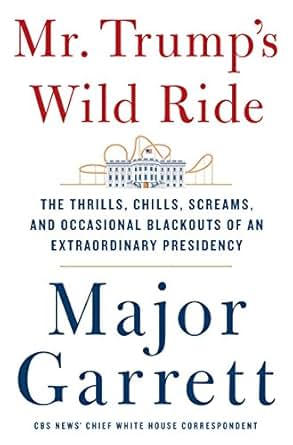Does Trump Matter?
Excerpted from Mr. Trump's Wild Ride: The Thrills, Chills, Screams, and Occasional Blackouts of an Extraordinary Presidency, out now from All Points Books.
The first year of the Trump presidency ended as it had begun: a cauldron of confusion, legislative disarray, international disbelief, Democratic rage and Republican bewilderment—all simmering over the coals of racism. That’s one perspective. Every part of it objectively accurate. Another is Trump’s first year ended with a smashing legislative victory that lowered individual and corporate tax rates and simplified the tax code for the first time since 1986. That capped a year of accelerating economic growth, a hefty populating of the federal bench with judicial conservatives, a new European conversation edging toward Trumpian precepts on immigration and military burden-sharing and revamped federal regulations as unabashedly pro-business as any administration since Ronald Reagan. These vastly different interpretations of Trump’s first year, both accurate, illustrate the conundrum that is Trump and his confounding presidency. It accomplished as it appalled. It was chaotic, confusing and, despite itself, historically competent. Much of the hand- wringing that was visited upon Trump’s first year was, justifiably, focused upon this unique new president’s effect on American institutions—the White House, Congress, the courts, the free press, even the resilience of America’s identity—and what shape they would find themselves in at the end, however long it might be, of Trump’s reign. Trump matters more than we can currently comprehend. His very presidency still startles because it’s real, and the reality TV part is both a joke and a truism. Historians have long debated how much the president reflects the country or the country comes to reflect the president. Trump is the first president never to have held public office or to have led armies to victory in battle. Already this tells us something about a new American idea of what makes a president.
Personally, Trump disdained politics and avoided active duty military service. He is a hero and an antihero at the same time. His long history of self-promotion and fascination with tabloid culture fits more seamlessly than we might want to admit into our current selfie and social media mind-set and mania—a place where relentless self-branding can be a path to notoriety, infamy, riches and at times all three. From the moment of his election, Trump was a force for and a crucible of division . . . and devotion. His presidency, quite apart from its record, is already original. No one has been more publicly tempestuous, dare we say stormy, with the words and mannerisms of the presidency.
Trump is recklessly authentic—a living, breathing, orangish and hairsprayed Rorschach test of what early-21st-century America wants and expects from politics and the presidency. Importantly, Trump is also a barometer of how much we as a nation are prepared for this highly personalized and vocalized presidency to permeate—through the minor miracle of digital technology—every moment of our waking lives. Eleven days into Trump’s presidency, one of the great satirists of our times, Jon Stewart, read aloud on The Late Show with Stephen Colbert a mock executive order: ‘I, Donald J. Trump, do declare by executive order that I, Donald J. Trump, am exhausting.’ It has been 11 days, Stephen,” Stewart said to the host. “Eleven fucking days. Eleven! The presidency is supposed to age the president, not the public. We have never faced this before. Purposeful, vindictive chaos.” Part of Trump’s originalism exists within that humor, that truth and that collective (and possibly exaggerated) anxiety. And yet on Inauguration Day, my CBS colleague Dean Reynolds was in Kenosha, Wisconsin, one of the crucial states in Trump’s electoral map. He was surveying voter attitudes and expectations at Frank’s Diner. “I think you got a country that’s fed up with the establishment and they wanted change and they didn’t want a politician,” said Jim Roberts, a Kenosha city worker. Glen Woods, sitting at the diner’s counter, summed up the Trump mystique. “He’s a pit bull. He swam upstream against both parties. I’ve never seen that before.” Reynolds asked if Woods considered Trump a disruptive force. “Oh, absolutely. Tear 90 percent of it down. He was the only candidate who seemed to really hammer in that you can’t tell people to go get a job if there aren’t any.” All presidencies arrive with lofty expectations. Historic ones leave behind big ideas and big changes. What kind of presidency is Trump’s? What kind of president is he?








